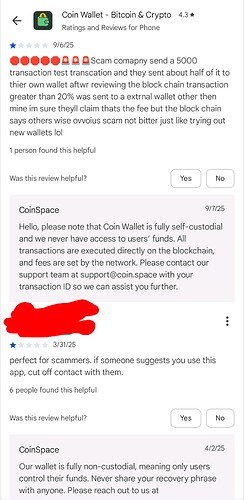Website
Short description
Coin Wallet is a self-custodial/non-custodial, open-source cryptocurrency wallet, launched in 2015 by CoinSpace LLC, Georgia, USA, with support for Monero (XMR).
Additional details
Coin Wallet has a Monero solution that works without remote nodes and without downloading the full blockchain.
GitHub: CoinSpace · GitHub
We support 24 cryptocurrencies across all platforms: Web, mobile (iOS, Android), desktop (macOS, Linux, Windows), and Tor (.onion)
We added Monero in 2021: Release v4.0.0 Monero XMR · CoinSpace/CoinSpace · GitHub
For Monero (XMR), we developed a unique solution that sets us apart. Unlike traditional wallets, we do not download the full blockchain (250+ GB), and we also avoid using remote nodes - which often compromise privacy and security.
In our approach, transactions are processed locally on the user’s device when a transaction ID is entered. This reduces some convenience but provides significant advantages in security and speed (instant access to Monero).
CS Monero Wallet: GitHub - CoinSpace/cs-monero-wallet: Monero wallet
Monero Core JS: GitHub - CoinSpace/monero-core-js: JS library for creating Monero transactions
Monerolib: GitHub - CoinSpace/monerolib: Monero JavaScript library
This solution has been in use for 4 years already and has proven itself as a solid alternative: Reddit - The heart of the internet
We are also listed and tested in Monero and Tor directories: monero.observer, monerica, tor.run, tdw.is (plus various onion lists, which I won’t mention here to avoid compromising them).
All these listings were done freely and voluntarily by their owners and the community.
Anticipated question: Why isn’t Coin Wallet listed on getmonero.org?
We were previously rejected, most likely because our wallet is JavaScript-based. Quoting: “We don’t need more MyMonero and Edge on getmonero”
There was also a mention about transaction fees - not confirmed as the reason for rejection, but noted.
Summary
Advantages:
- Light Monero wallet, works on all devices
- Never shares the private view key with remote nodes, since syncing happens locally on the device
- Full Tor network support (Tor + Monero wallet with no remote nodes)
- Financial independence from on-ramps, swap aggregators, or donations (most wallets depend only on these)
Disadvantages:
- JavaScript implementation
- Transfer fees
- Non-standard Monero user experience, users must add the txid manually.
